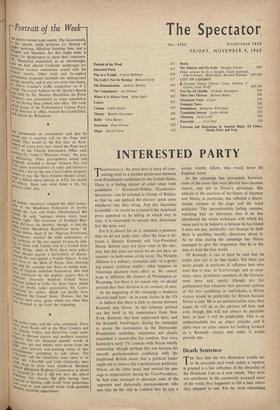INTERESTED PARTY
TRADITIONALLY, the press here is wary of com- mitting itself to a decided preference between rival Presidential candidates in the United States. There is a feeling almost of relief when both candidates — Roosevelt-Willkie, Eisenhower- Stevenson—can be ticketed as friends of Britain, so that we can applaud the electors' good sense whichever way they swing. And this discretion is sensible : we would be irritated if the American press appeared to be telling us which way to vote; it is reasonable to assume that Americans feel the same way.
Yet it is absurd for us to maintain a pretence that we do not really care, when the issue is be- tween a Senator Kennedy and Vice-President Nixon. Britons may not have votes in the elec- tion, but this does not mean we do not have an interest—in both senses of the word. The Western Alliance is a military, economic and—to a grow- ing extent—political reality : what happens in American elections must affect us. We cannot hope to influence the electors of Washington or Wyoming; but there is no reason why we should pretend that their decision is no concern of ours.
At the beginning of the campaign a tendency showed itself here—as in some circles in the US —to believe that there is little to choose between Kennedy and Nixon. As Ian Gilmour pointed out last week in his commentary from New York, Kennedy has been underrated here; and the Kennedy bandwagon, during his campaign to secure the nomination as the Democrats' Presidential candidate, sometimes too closely resembled a steamroller, for comfort. Nor were Kennedy's early TV contests with Nixon wholly reassuring—though perhaps this was because his smooth professionalism conflicted with the traditional British desire that a political leader ought not to behave like a professional politician.
Nixon, on the other hand, had worked his pas- sage to respectability during his Vice-Presidency; he had even managed to persuade most of the reporters and diplomatic correspondents who met him on his visit to London that he was a sound, worthy fellow, who would never let England down.
As the campaign has proceeded, however, some of the issues that were blurred have become clearer, and not to Nixon's advantage. His attitude to the question of the future of Quemoy and Matsu, in particular, has reflected a discre- ditable mixture of the jingo and the ward politician. The uncomfortable feeling remains, watching him on television, that if he has abandoned the smear technique with which his name used to be linked it is because he has found it does not pay, politically—not because he feels there is anything morally obnoxious about it. At no time during the campaign has Nixon managed to give the impression that he is the man to lead the free world.
Of Kennedy it can at least be said that he might turn out to be that leader. Yet there are many people in positions of influence here who want him to lose. At Scarborough, and on occa- sions, since, prominent members of the Govern- ment have said openly (though not for publication) that whatever their personal opinion of the two candidates as individuals, a Nixon victory would be preferable for Britain because Nixon is safe. He is an administration man, they argue; he will do as his advisers tell him; and even though this will not always be palatable here, at least it will be predictable. This is an understandable but an abject attitude; and if there were no other reason for looking forward to a Kennedy victory next week, it would provide one.














































 Previous page
Previous page